#Congo cobalt exploitation
Explore tagged Tumblr posts
Text
"Congo has half the world's reserves of cobalt but an ethical supply chain of cobalt from Congo does not exist."
282 notes
·
View notes
Text
Congo💔🕊️
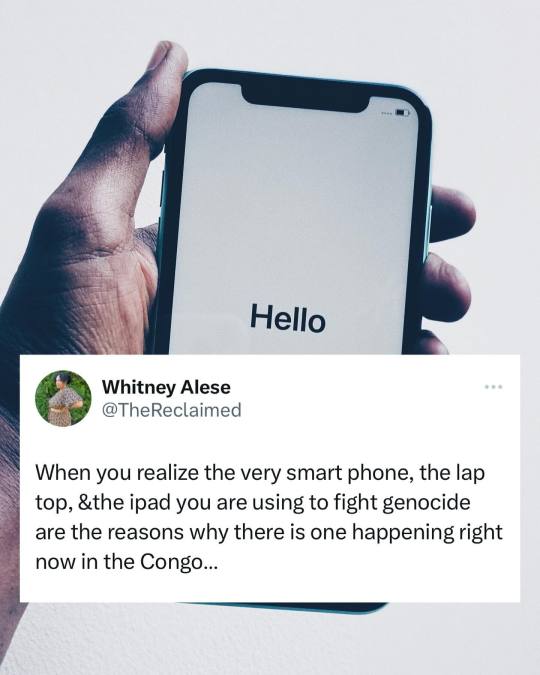
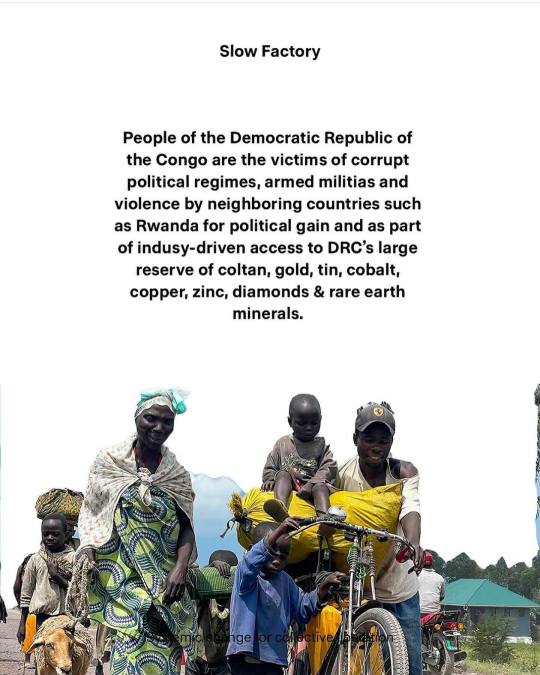
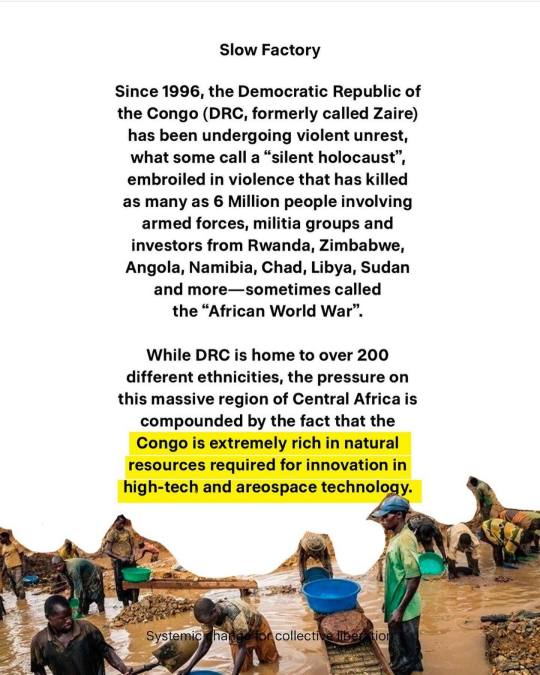
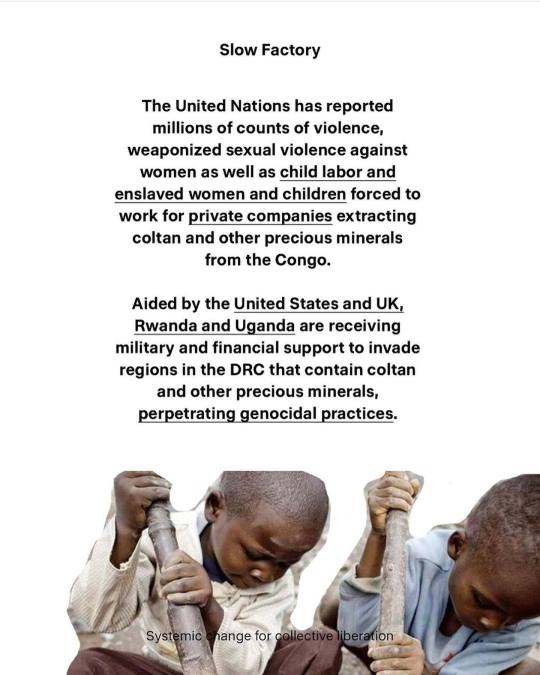
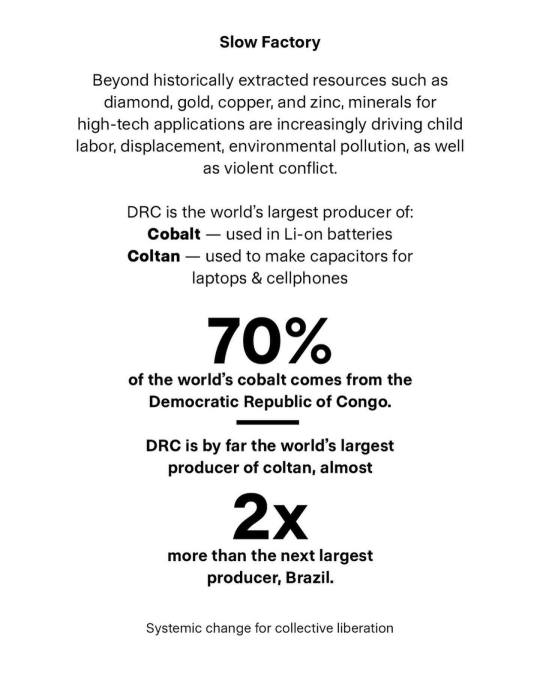
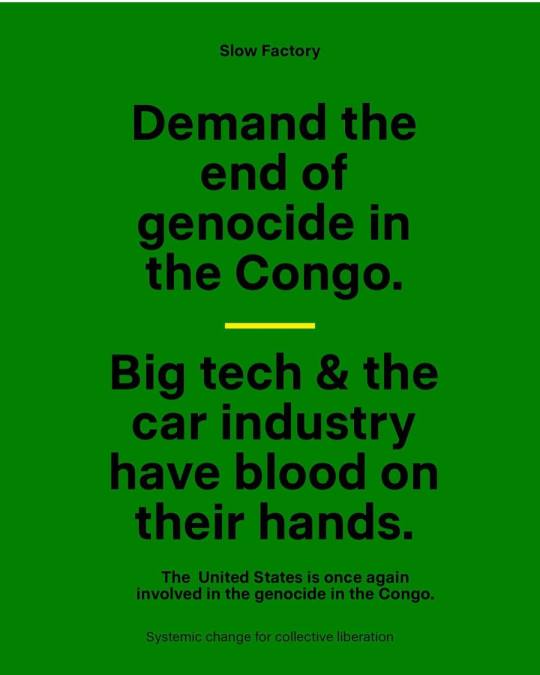
We really cannot be free until we all are free.
#Congo Genocide#Conflict Minerals#Cobalt Exploitation#Coltan Crisis#Resource Exploitation#Human Rights Abuse#Environmental Impact#Corporate Accountability#DRC#Mineral Supply Chain
14K notes
·
View notes
Text
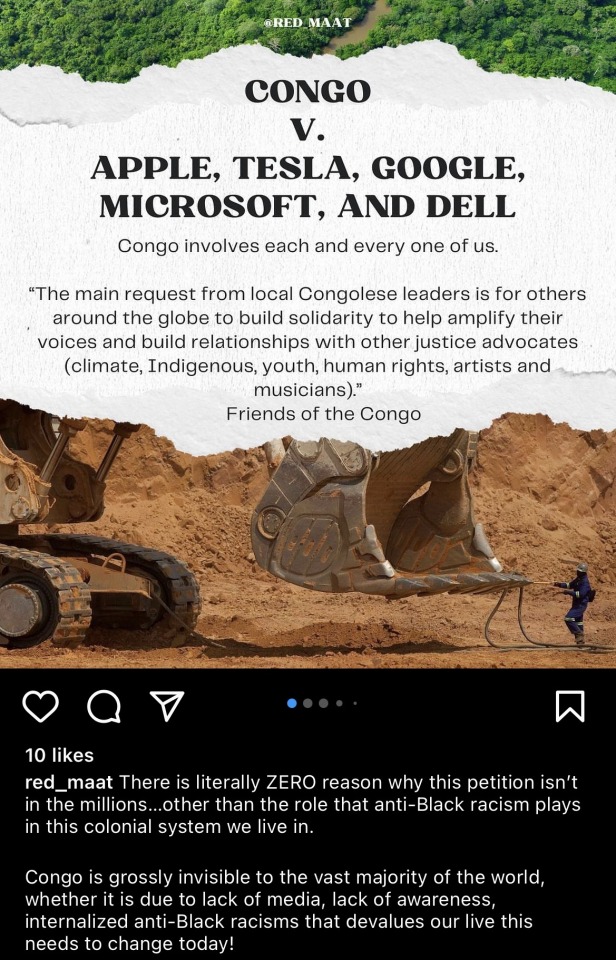
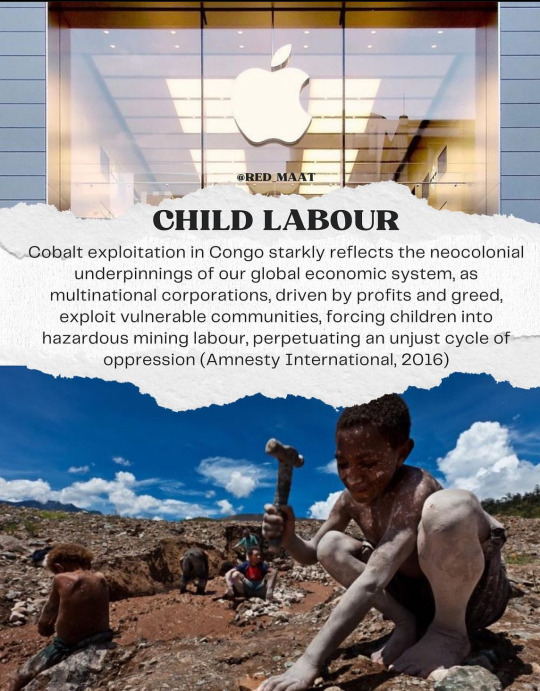
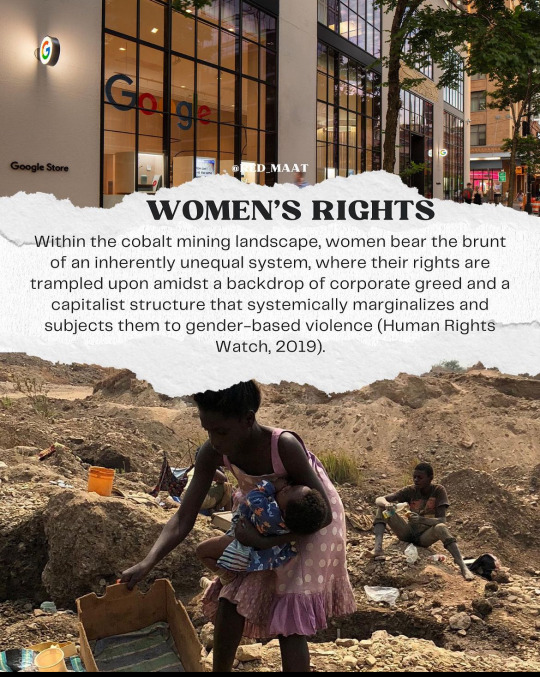
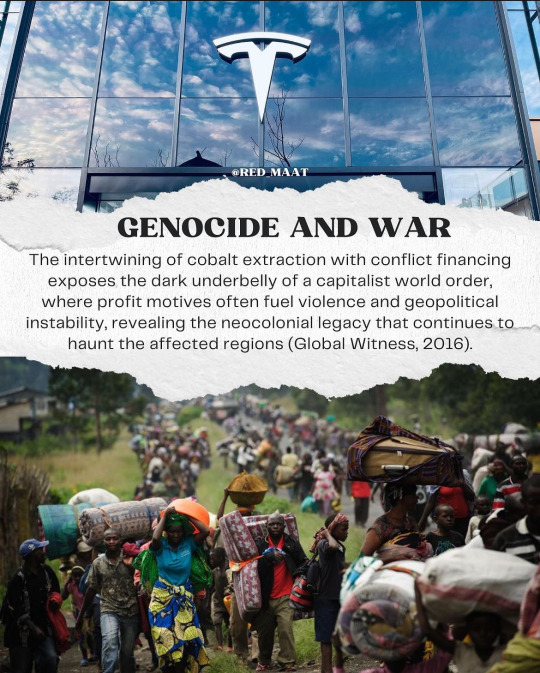
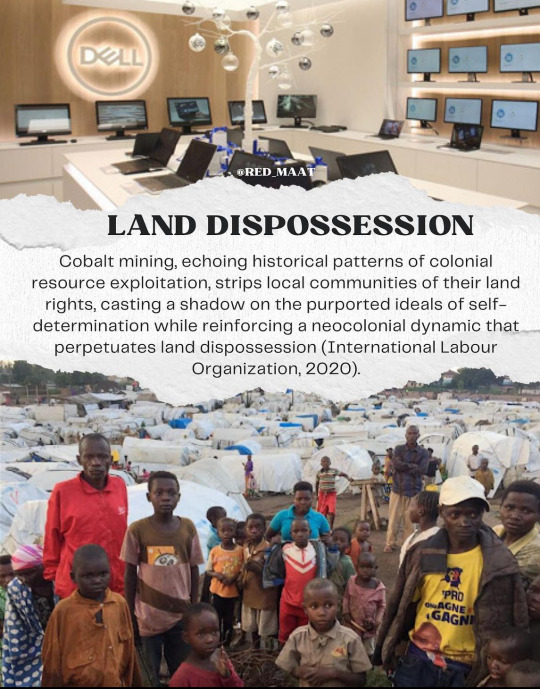
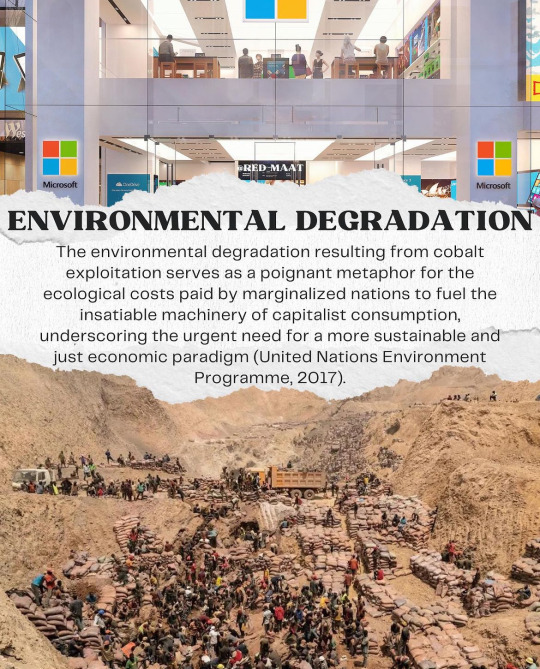
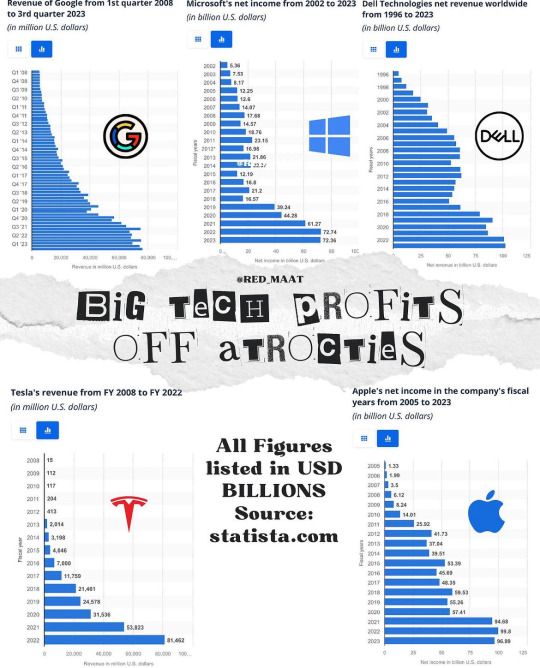
#congo#drc#signal boost#genocide#exploitation#theft#resources#child labor#crimes against humanity#modern day slavery#womens rights#black lives matter#black liberation#the cost of technology#cobalt mining#current events#colonialism#imperialism#red maat#tysir salih#Democratic Republic of the Congo#dr congo#congo kinshasa#the congo
342 notes
·
View notes
Text
Continuing from here:
#The Conversation#articles#mining#mineral mines#exploitation#slavery#child labour#child labor#workers' rights#Democratic Republic of Congo#DRC#cobalt mines#technology#off topic
5 notes
·
View notes
Text
Cobalt Mines And Child Exploitation
A child working in mines. Image Credit: Vlad Karavaev/Shutterstock.com Big Tech and Child Exploitation in Cobalt Mines: Ethical Challenges for the Clean Energy Industry With the growing global demand for electronics and electric vehicles, cobalt is emerging as a key ingredient in lithium-ion batteries used in these technologies. While cobalt is a key part of the transition to clean energy,…
2 notes
·
View notes
Text
instagram
Pay more attention to Congo. Our tech is made from the exploitation of Congo and its resources. The Congolese people deserve freedom and safety, but are being displaced, abused, killed, and exploited.
#congo genocide#dr congo#save congo#free congo#democratic republic of the congo#congolese#congo#help congo#stop child abuse#stop child exploitation in Congo#coltan#cobalt#africa#resources in Africa#exploitation#adding tags to your posts helps people find them#things you should care about#you should care#things that make me mad#things that matter#things that keep me up at night#tumblr say something#tumblr fypage#Instagram
6 notes
·
View notes
Text
"The story of 'John Doe 1' of the Democratic Republic of the Congo is tucked in a lawsuit filed five years ago against several U.S. tech companies, including Tesla, the world’s largest electric vehicle producer. In a country where the earth hides its treasures beneath its surface, those who chip away at its bounty pay an unfair price. As a pre-teen, his family could no longer afford to pay his $6 monthly school fee, leaving him with one option: a life working underground in a tunnel, digging for cobalt rocks. But soon after he began working for roughly two U.S. dollars per day, the child was buried alive under the rubble of a collapsed mine tunnel. His body was never recovered.
The nation, fractured by war, disease, and famine, has seen more than 6 million people die since the mid-1990s, making the conflict the deadliest since World War II. But, in recent years, the death and destruction have been aided by the growing number of electric vehicles humming down American streets. In 2022, the U.S., the world’s third-largest importer of cobalt, spent nearly $525 million on the mineral, much of which came from the Congo.
As America’s dependence on the Congo has grown, Black-led labor and environmental organizers here in the U.S. have worked to build a transnational solidarity movement. Activists also say that the inequities faced in the Congo relate to those that Black Americans experience. And thanks in part to social media, the desire to better understand what’s happening in the Congo has grown in the past 10 years. In some ways, the Black Lives Matter movement first took root in the Congo after the uprising in Ferguson in 2014, advocates say. And since the murder of George Floyd and the outrage over the Gaza war, there has been an uptick in Congolese and Black American groups working on solidarity campaigns.
Throughout it all, the inequities faced by Congolese people and Black Americans show how the supply chain highlights similar patterns of exploitation and disenfranchisement. ... While the American South has picked up about two-thirds of the electric vehicle production jobs, Black workers there are more likely to work in non-unionized warehouses, receiving less pay and protections. The White House has also failed to share data that definitively proves whether Black workers are receiving these jobs, rather than them just being placed near Black communities. 'Automakers are moving their EV manufacturing and operations to the South in hopes of exploiting low labor costs and making higher profits,' explained Yterenickia Bell, an at-large council member in Clarkston, Georgia, last year. While Georgia has been targeted for investment by the Biden administration, workers are 'refusing to stand idly by and let them repeat a cycle that harms Black communities and working families.'
... Of the 255,000 Congolese mining for cobalt, 40,000 are children. They are not only exposed to physical threats but environmental ones. Cobalt mining pollutes critical water sources, plus the air and land. It is linked to respiratory illnesses, food insecurity, and violence. Still, in March, a U.S. court ruled on the case, finding that American companies could not be held liable for child labor in the Congo, even as they helped intensify the prevalence. ... Recently, the push for mining in the Congo has reached new heights because of a rift in China-U.S. relations regarding EV production. Earlier this month, the Biden administration issued a 100% tariff on Chinese-produced EVs to deter their purchase in the U.S. Currently, China owns about 80% of the legal mines in the Congo, but tens of thousands of Congolese work in 'artisanal' mines outside these facilities, where there are no rules or regulations, and where the U.S. gets much of its cobalt imports. 'Cobalt mining is the slave farm perfected,' wrote Siddharth Kara last year in the award-winning investigative book Cobalt Red: How The Blood of the Congo Powers Our Lives. 'It is a system of absolute exploitation for absolute profit.' While it is the world’s richest country in terms of wealth from natural resources, Congo is among the poorest in terms of life outcomes. Of the 201 countries recognized by the World Bank Group, it has the 191st lowest life expectancy."
3K notes
·
View notes
Text

𝗨.𝗦. 𝗖𝗢𝗨𝗥𝗧 𝗖𝗟𝗘𝗔𝗥𝗦 𝗧𝗘𝗖𝗛 𝗚𝗜𝗔𝗡𝗧𝗦 𝗢𝗙 𝗖𝗢𝗡𝗚𝗢 𝗔𝗕𝗨𝗦𝗘𝗦
Not guilty.
That's the verdict of a US federal appeals court in a case involving five tech companies accused of benefitting from child labour in Congolese mines. On 5th March, 2024, the US Court of Appeals for the District of Columbia made a 3-0 decision in favour of (Google’s parent company) Alphabet, Microsoft, Dell, Tesla and Apple Inc. in a case filed by 16 former Congolese child miners and their guardians.
The plaintiffs accused the companies of "deliberately obscuring" their dependence on child labour, in effect abetting the exploitation of many children to ensure steady supplies of cobalt. Some of the complainants were the guardians of children who’d been killed in cobalt-mining operations.
The court ruled that buying cobalt in the global supply chain did not amount to "participation in a venture," and there was no proof that the tech giants had anything more than a buyer-seller relationship with suppliers or had the power to stop the use of child labour.
Cobalt is in high demand as competition for market leadership in Electric Vehicle sales kicks into high gear. Nearly two-thirds of the world's cobalt is mined in DR Congo. The country has 2-million artisanal miners working under horrible conditions, according to DelveDatabase, an online database. Four critical minerals - copper, nickel, cobalt and lithium - will generate $16 trillion in the next 25 years, according to the IMF.
DR Congo's vast wealth is the key reason for the country's long history of exploitation and conflict - from Belgian King Leopold II running the country as his private estate to Western tech firms churning out high-end goods using Congolese minerals.
Help raise awareness of the exploitation of Congolese children by sharing this video widely.
2K notes
·
View notes
Text

hello. you can crack open any of these "disposables" like an oyster and refill them. you don't need to throw a lithium battery away just because the e-juice ran out. buy some e-juice. it's cheap. or make your own. you can drip it into the top of the sponge in there or take the sponge out and soak it or use a syringe to saturate the sponge from top to bottom directly. be careful not to rip the delicate little wires off the circuitboard or the battery, but even if you did, you could re-solder it. "disposable" vapes are one of the biggest consumer scams going rn and it makes me really mad
the lithium and cobalt in these batteries are being destructively mined from multiple places in the world including Congo. you can save an enormous amount of money, time, and avoid contributing to mineral exploitation all at once with this one weird trick
edit: please don't refill nicotine vapes with weed oil or weed vapes with nicotine liquid. different kinds of vapes and also there will be an oil/water problem. refill nicotine vapes with nicotine liquid and weed vapes with weed oil. don't cross-contaminate. I don't think anything catastrophic will happen, I just think it will break the vape and waste your time
965 notes
·
View notes
Text
THERE'S ALSO A GENOCIDE HAPPENING IN THE CONGO!!!!! THERE'S ALSO A GENOCIDE HAPPENING IN THE CONGO!!!!! THERE'S ALSO A GENOCIDE HAPPENING IN THE CONGO!!!!!
#congo#genocide#horror#congo genocide#conflict minerals#cobalt exploitation#coltan crisis#resource exploitation#human rights abuse#environmental impact#corporate accountability#drc#mineral supply chain
2K notes
·
View notes
Text
“This system of severity of exploitation of poor people of color at the bottom of global supply chains goes back centuries. Few people sitting for breakfast in England in the 1700s knew that their tea was sweetened by sugar harvested under brutal conditions by African slaves toiling in the West Indies. The slaves remained far removed from the British breakfast table until a band of abolitionists placed the true picture of slavery directly in front of the English people. Stakeholders fought to maintain the system. They told the British public not to trust what they were told. They espoused the great humanity of the slave trade—Africans were not suffering, they were being “saved” from the savagery of the dark continent. They argued that Africans worked in pleasing conditions on the islands. When those arguments failed, the slavers claimed they made changes that remedied the offenses taking place on the plantations. After all, who was going to go all the way to the West Indies and prove otherwise, and even if they did, who would believe them?
The truth, however, was this—but for the demand for sugar and the immense profits accrued through the sale of it, the entire slavery-for-sugar economy would not have existed. Furthermore, the inevitable outcome of stripping humans of their dignity, security, wages, and freedom can only be a system that results in the complete dehumanization of the people exploited at the bottom of the chain.
Today’s tech barons will tell you a similar tale about cobalt. They will tell you that they uphold international human rights norms and that their particular supply chains are clean. They will also assure you that conditions are not as bad as they seem and that they are bringing commerce, wages, education, and development to the poorest people of Africa (“saving” them). They will also assure you that they have implemented changes to remedy the problems on the ground, at least at the mines from which they say they buy cobalt. After all, who is going to go all the way to the Congo and prove otherwise, and even if they did, who would believe them?
The truth, however, is this—but for their demand for cobalt and the immense profits they accrue through the sale of smartphones, tablets, laptops, and electric vehicles, the entire blood-for-cobalt economy would not exist. Furthermore, the inevitable outcome of a lawless scramble for cobalt in an impoverished and war-torn country can only be the complete dehumanization of the people exploited at the bottom of the chain.
So much time has passed; so little has changed.”
— from Cobalt Red, Siddharth Kara
#perhaps cynically I would add it isn’t just ‘who would believe it if they knew’ but also ‘would they care’#cobalt red#resource extraction#colonialism#cobalt#slavery#skravler
498 notes
·
View notes
Text
As Elon Musk’s Department of Government Efficiency (DOGE) has ravaged its way though the United States Agency for International Development (USAID), cutting its workforce from 10,000 to just 300, hundreds of organizations providing vital safety services have been upended. Multiple children’s safety groups—including those fighting online child sexual abuse and exploitation—say their efforts have been severely hamstrung.
Groups identifying victims and providing care for those who have been subject to online exploitation or human trafficking are struggling to support the vulnerable children, multiple organizations tell WIRED. Such child safety projects often take place in poorer countries, which can have fewer resources to support victims or investigate crimes. Sources say that funding for safe houses has been paused, potentially exposing victims to more harm, and efforts that identify criminals behind child exploitation have been put on hold.
“It will be very hard for us to identify the victims,” says Chantal Yelu Mulop, from the Coordination for Youth and the Fight Against Sexual Violence and Trafficking in Persons (CJVFFT), in the Democratic Republic of the Congo. While the war-torn country faces new fighting and humanitarian crises, children have long been trafficked to work in cobalt mines linked to the production of smartphone and EV batteries.
As USAID funding was withdrawn over the past week, Mulop says her organization had just started helping around 25 newly identified victims of human trafficking—all of them aged under 17. The group was taken to a support shelter run by another organization. “When we bring them there, USAID was ready to help. A few hours later they cancel,” Mulop says. “There’s no food, no nothing that we can provide to them,” she adds.
While the USAID cuts have been immediate, global child protection projects have also faced a funding pause from the State Department. This foreign aid “pause,” issued by the Trump administration, is set to last for at least 90 days. USAID did not respond to WIRED’s request for comment. The State Department had not provided a comment by time of publication.
Both government bodies have provided funding to help countries and people around the world. This includes USAID’s vast swath of health care and education programs—their withdrawal is putting millions of lives at risk and limits tackling the climate crisis. In Southeast Asia, several patients at a migrant camp reportedly died after medical support was removed.
Counter-human-trafficking funding often includes money for projects that help to crack down on online child exploitation and sexual abuse. Funding can be provided to international organizations that coordinate efforts and work with partners, like Mulop’s CJVFFT, on the ground. The funding can directly support victims, as well as providing expertise to officials in countries, and stop more children becoming targets.
“Many of these victims engage with their traffickers through electronic means,” says Jessica Ryckman, the executive director of the nonprofit Lawyers Without Borders (LWOB), which works on trafficking and child exploitation programs and has been impacted by the funding changes. “It is exploitation that is advanced through digital technology.”
Over the years, the programs have been effective. For instance, a four-year partnership between the US and the Philippines, which started under the first Trump administration and ended in 2021, helped protect hundreds of children: More than 350 kids were rescued and supported and almost 100 potential criminals arrested. The new cuts also come as record levels of online child sexual abuse imagery are being discovered.
“Victims and perpetrators alike originate from diverse regions and countries, underscoring the necessity for continued international engagement and coordinated efforts to address these crimes comprehensively,” says an employee of a South American child protection group that works to combat trafficking and online sexual abuse. The organization, like others in this story, was granted anonymity to speak given the sensitive nature of the work and uncertainty about future funding. “The interruption of these funds inevitably limits the scope and reach of these critical services,” it says.
One person, who works for an organization running multiple child protection projects, says operations in one southeastern European country have been widely disrupted. Within the country, the organization’s projects have 147 victims of trafficking in its care, the person says. “The ongoing pause and potentially the cessation of funding would have significant and negative impact on our capacity and ability to provide essential services to these victims who are in fragile stages of their recovery; some of whom are in ongoing programs for psycho-social counseling related to their trauma,” the person says.
Multiple members of LWOB say children are being put further at risk in the projects it runs in East Africa. “These children may not be identified, the practices to reduce their trauma aren't being supported right now,” says Ryckman. “Even if they are identified, they may be put in a pipeline where they are going to have to face ongoing interviews about their trauma or face their traffickers again.”
LWOB has, along with partner organizations, identified around 200 victims of human trafficking in Tanzania, with the majority referred to safe houses, says Lulu Makwale, a victim service coordinator at Lawyers Without Borders. “Most of the funding for the safe houses has been paused, meaning the services and the needs of the victim are also being paused too,” Makwale says. She says the organization has been linking up shelters to investigators up until now. “Victims may not be connected well now to the law enforcement,” Makwale says.
As well as supporting victims directly, many of the efforts also provide training or technical assistance to police forces, allowing them to better investigate crimes. One program listed on the State Department’s list of counter-trafficking funding says it is providing training to combat online child sexual exploitation for 10,000 police officers, prosecutors, and judges in 100 countries.
The person with links to work in a European country says their organization has 74 investigations into traffickers ongoing, plus 66 prosecutions that are underway. They say that the funding changes will have a “significant and negative impact on these criminal trials” and the safety of people who may give evidence in the cases.
Ryckman, from Lawyers Without Borders, says the organization recently completed work on an online database for identifying victims and tracking online child exploitation in Kenya. While the database is functional, Ryckman says, future work to train people has been paused, and there will be a slower uptake of the system. “I do believe it will be used, and it will be extremely useful,” Ryckman says. “But these victims are there now. They shouldn’t have to wait.”
128 notes
·
View notes
Text
While we’re spreading the word about Palestine, free Sudan and free the Democratic Republic of the Congo too.
There is a genocide going on in the Darfur region of Sudan. It’s been going on for 20 FUCKING YEARS. 2,000 people have died in just 5 days. Because of the Darfur genocide, millions (maybe even more) of people have either been raped, killed or displaced. Since April of 2023, things have gotten worse in the country. The UN just fucking withdrew from Sudan. The media has not said a word about this.
In the Congo, there is a genocide going on as imperial powers are exploiting the country for its resources. Many people, including women and children, are being forced to mine hazardous materials like cobalt. Those materials are not safe to touch or breathe unless there is safety equipment involved, and they don’t get any safety equipment. They are fucking being FORCED to touch and breathe those materials with nothing to protect them every day, and many people, including mothers with their babies strapped to their backs, are not exempt from this.
The materials many people are forced to mine and expose themselves to were probably used to manufacture the screen I am using to type this and the screen you are staring at right now. Please, do not buy new phones, computers, consoles, cars, etc. if you do not want to support this practice, if you absolutely HAVE to buy one of these, I suggest you go for used stuff. You can survive without buying the newest iPhone model, I promise your year old phone is still going to be very useful to you.
Please reblog, I dont care if you think this doesn’t fit your blog’s aesthetic.
#free sudan#free congo#darfur#darfur genocide#congo genocide#fuck genocide#important#free palestine#black lives matter#blacklivesmatter#blm#the people of sudan and congo are black so yeah
836 notes
·
View notes
Text
Let’s talk about Congo.
TW:: Mentions of R*pe, m*rder, etc!!
Basically, if you don’t know: The people of the Democratic Republic of the Congo (Or the DRC) has been suffering due to big tech companies like Apple, Alphabet Inc., Google, Dell, Microsoft and Tesla. They have been exploiting Congo’s land for their minerals like Diamonds, Gold, Copper, Cobalt, Tin, Tantalum and Lithium. These companies use these minerals to make phones, cars, computers and other technology.

The people of Congo are being treated like dirt, like they worth less than the colonizers stealing from them. The colonizers, which they call ‘Rebels’ have been r*ping, killing brutally, enslaving, and starving them. They are being kicked out of their land because these big tech companies want it. They’re being killed and r*ped because these big tech companies think they have the right.





This isn’t right!! So research what’s going on, tell others, spread awareness. Look up what companies are exploiting Congo and boycott. Don’t buy their stuff, keep using your phone or laptop until it’s broken and unusable.
If you want to know more about it: use this website
If you want to donate: Use these websites!!
Reblog this
spread awareness!!

#free congo#Congo#Awareness#democratic republic of the congo#Boycott apple#boycott tech companies#boycott#congo awareness#Donate#Gofundme#Donate to Congo
213 notes
·
View notes
Text
The thing is, these tech corporations have the ability to ethically mine cobalt.
The mineral found in Congo that is used to make electronics.
They could train willing people to mine it, creating jobs.
And making sure that the working conditions were safe, were up to code. Make a desl with leaders.
It wouldn't even dent their bank accounts to make it safer and ethical to do so.
But they won't.
They choose to send children with no protective equipment into these mines.
They choose to exploit Congo natural resources and enslave it's people for their own benefit.
Because that's what capitalism is built on, exploitation.
Slavery never ended.
It just got easier to hide.
625 notes
·
View notes
